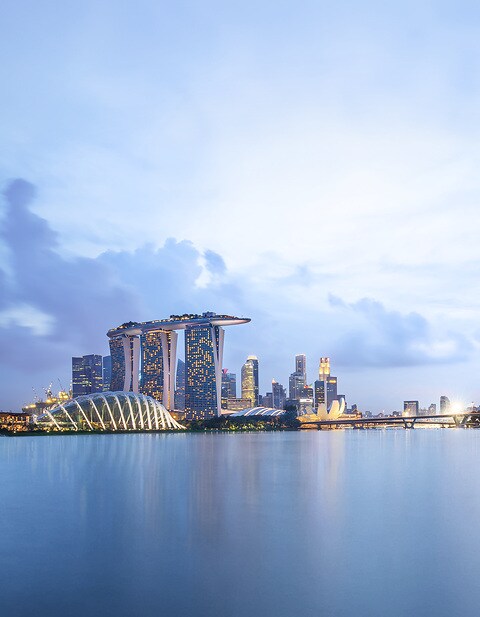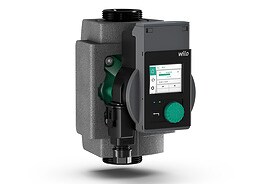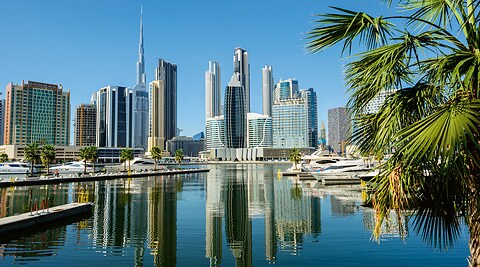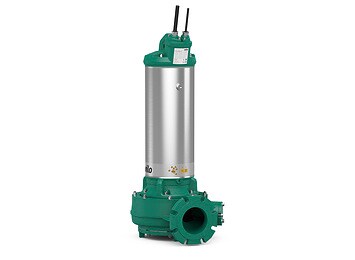THE WORLD’S POPULATION is growing rapidly and will increase to around 10 billion people by 2050. Cities are growing even more quickly – especially in Asia and Africa. These regions in the Global South are seeing new megacities emerge, while this development in Europe and North America is progressing more slowly and is more likely to result in the densification of existing urban regions.
Wilo’s long-term strategy is based on five megatrends: urbanisation, water shortage, globalisation 2.0, climate change and energy shortage. These are supplemented by the digital transformation, which is a key factor in dealing with the challenges that the megatrends entail.
The development of cities plays a central role in relation to the other megatrends. Cities are often the driving force behind economic development. The concentration of companies, services and jobs in one place stimulates progress and economic growth. Highly qualified talents are increasingly drawn to urban centres. This promotes the knowledge society and creates an environment that fosters innovation and creativity. Today, the engines of this development can be found in the Global South. But increasing urbanisation is also accompanied by significant challenges.

Singapore has established itself as one of the world’s leading smart cities.
Climate change is without doubt one of the greatest challenges of our time, and combating it will require a global effort. While the Global North bears the major responsibility for global warming, it is primarily the Global South that has to deal with its effects. A striking example of this is Jakarta, the capital of Indonesia, where parts of the city already lie below sea level today and which faces a massive threat from the impact of climate change. In response to this, the Indonesian government is planning to build a new capital city, Nusantara, which will lie high enough to be protected from rising water levels. The government of Indonesia and Wilo have signed a memorandum of understanding on defining the strategic cooperation for developing the visionary planned city.
Cities are a major contributor to climate change, which is precisely why they also play a key role in combating it. Urban regions are responsible for a good 70 percent of global carbon emissions. However, this means they also offer by far the largest potential savings. The need for intelligent energy supply systems and improved energy efficiency in cities are therefore crucial in the fight against climate change.

With the high-efficiency pump Wilo-Stratos PICO, considerable energy-saving potential can be realised.
WATER is another critical resource. Water shortages are increasingly posing a global problem. Around one quarter of the world’s population has no access to clean fresh water. This number is expected to total 2.4 billion by 2050. According to UNICEF, 1.4 billion people are already living in areas with a high or extremely high level of water insecurity even today. Here, too, it is the Global South that is particularly hard hit. This is why Wilo has set itself the goal of providing better access to clean water for 200 million people by 2030.
Of the 33 current megacities, 12 are located in regions facing extremely high water uncertainty. This number is likely to rise to 19 by 2050. The massive urbanisation taking place in the Global South will require significant investment in critical infrastructure. One of the greatest challenges for growing cities is the water supply. Ensuring a sustainable and equitable water supply is key for the quality of life and health of urban populations. Access to clean water remains a fundamental challenge, especially in the rapidly expanding cities of the Global South. To guarantee an appropriate supply for the people living there, it is estimated that USD 11.7 billion will have to be invested in the coming decades in projects to improve the water infrastructure – projects in which Wilo will also play a part.

Water is precious, especially in the desert – Dubai has been able to minimise its water losses significantly through massively improved water management.
AROUND THE GLOBE, there are numerous examples of how cities have been able to achieve great success using innovative approaches. For example, Dubai has reduced its water loss due to leaks from 42 percent in 1988 to around 5 percent today thanks to massively improved water management. This puts the emirate in a significantly better position than cities in North America, for example, where losses average 15 percent.
Singapore is striving to be completely self-sufficient in terms of water by 2061, with 85 percent of its freshwater to be provided through desalination and recycled “NEWater”. The Southeast Asian city state has generally established itself as one of the leading smart cities in the world by using technology and innovation to improve life in the city and organise it more efficiently. From intelligent traffic systems, through sustainable urban development to e-government services, the city has positioned itself at the leading edge of developments in many areas.
Singapore is thus an outstanding example of what can be achieved by using smart solutions in the areas of energy, water and infrastructure. The Wilo Group held its annual industry conference in Singapore in 2023. The event brought together Wilo’s expertise in the field of smart and sustainable water solutions and Singapore’s role as a real-world urban laboratory under the motto “Smart Urban Areas – Connecting Minds for a Multilateral World”. It is only with the help of innovative technology and through digital transformation that it will be possible to turn urban regions into smart urban areas and thus create the necessary conditions for successfully combating climate change and ensure that the cities of the future are liveable, healthy places.
The challenges associated with the megatrends will also place cities in particular under strong pressure to adapt. Only the development into smart cities and smart urban areas offers the opportunity to design sustainable urban areas, use resources efficiently and improve the quality of life. The key to success lies in integrating technology, people-centred design and sustainable urban planning.
Wilo offers products and systems that can make a significant contribution to this sustainable urban development and develops made-to-measure, energy-efficient and intelligent solutions for meeting the great variety of challenges in these areas.

The Wilo-Rexa SOLID-Q with Nexos Intelligence – Wilos system solution for smart sewage pump stations.